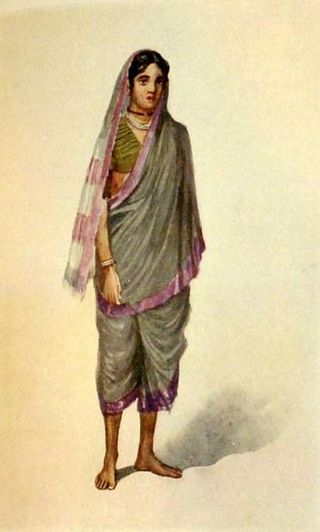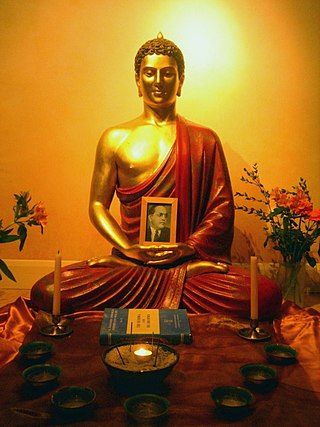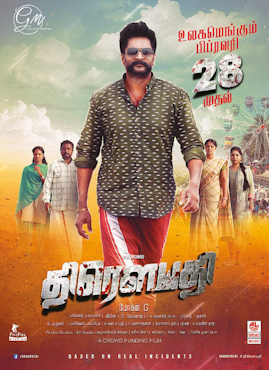
Dhardo Rinpoche (1917-1990), born Thubten Lhundup Legsang, was the 12th in a line of tulkus from Dhartsendo on the eastern border of Tibet who hailed from the Nyingma Gompa in Dhartsendo called Dorje Drak. The 11th tulku rose to the Abbot of Drepung and during the 1912 invasion of Tibet by China was the most senior of the retired abbots in the National Assembly. He died in 1916 and the 12th Tulku was born in 1917.
Karuṇā is generally translated as compassion or mercy and sometimes as self-compassion or spiritual longing. It is a significant spiritual concept in the Indic religions of Hinduism, Buddhism, Sikhism, and Jainism.

The Neo Buddhist movement is a religious as well as a socio-political movement among Dalits in India which was started by B. R. Ambedkar. It re-interpreted Buddhism and created a new school of Buddhism called Navayana. The movement has sought to be a socially and politically engaged form of Buddhism.
Engaged Buddhism, also known as socially engaged Buddhism, refers to a Buddhist social movement that emerged in Asia in the 20th century. It is composed of Buddhists who seek to apply Buddhist ethics, insights acquired from meditation practice, and the teachings of the Buddhist dharma to contemporary situations of social, political, environmental, and economic suffering, and injustice.

This list of Buddhism by country shows the distribution of the Buddhist religion, practiced by about 535 million people as of the 2010s, representing 7% to 8% of the world's total population.

Dalit, also previously known as untouchables, is the lowest stratum of the castes in the Indian subcontinent. Dalits were excluded from the four-fold varna system of Hinduism and were seen as forming a fifth varna, also known by the name of Panchama. Dalits predominantly follow Hinduism, with significant populations of the adherents of Buddhism, Sikhism, Christianity, and Islam. Scheduled Castes is the official term for Dalits, who get reservation under Positive discrimination, as per the constitution of India.

Kanshi Ram, also known as Bahujan Nayak or Manyavar or Saheb, was an Indian politician and social reformer who worked for the upliftment and political mobilisation of the Bahujans, the backward or lower caste people including untouchable groups at the bottom of the caste system in India. Towards this end, Kanshi Ram founded Dalit Shoshit Samaj Sangharsh Samiti (DS-4), the All India Backwards (SC/ST/OBC) and Minorities Communities Employees' Federation (BAMCEF) in 1971 and the Bahujan Samaj Party (BSP) in 1984. He ceded leadership of the BSP to his protégé Mayawati who has served four terms as Chief Minister of Uttar Pradesh.

Mahar is an Indian caste found largely in the state of Maharashtra and neighbouring areas. Most of the Mahar community followed B. R. Ambedkar in converting to Buddhism in the middle of the 20th century. As of 2017 the Mahar caste was designated as a Scheduled Caste in 16 Indian states.

Deekshabhoomi is a sacred monument of Navayana Buddhism located in Nagpur city in the state of Maharashtra in India; where B. R. Ambedkar with approximately 400,000 of his followers– mainly Dalits, several thousand of whom had been converted to Christianity– embraced Buddhism on Ashoka Vijaya Dashami on 14 October 1956. Ambedkar played a significant role in the revival of Buddhism in India, and inspired many such mass conversions to Buddhism.

Ramdas Bandu Athawale is an Indian politician, social activist and trade unionist from Maharashtra. He is the president of the Republican Party of India (A), a splinter group of the Republican Party of India and has its roots in the Scheduled Castes Federation led by Dr. B. R. Ambedkar since 1999. Currently, he is the Minister of State in the Ministry of Social Justice and Empowerment, Government of India since 2016 and represents Maharashtra in Rajya Sabha, the upper house of India's Parliament since 2014. Previously, he was Lok Sabha MP from Pandharpur from 1999 to 2009 and from Mumbai North Central Lok Sabha constituency from 1998 to 1999. He was also Cabinet minister of Maharashtra from 1990 to 1995 and a member of the Maharashtra Legislative Council from 1990 to 1996.

Buddhism is an ancient Indian religion, which arose in and around the ancient Kingdom of Magadha, and is based on the teachings of Gautama Buddha who was deemed a "Buddha", although Buddhist doctrine holds that there were other Buddhas before him. Buddhism spread outside of Magadha starting in the Buddha's lifetime.

Navayāna, otherwise known as Navayāna Buddhism, refers to the modern re-interpretation of Buddhism founded and developed by the Indian jurist, social reformer, and scholar B. R. Ambedkar; it is otherwise called Neo-Buddhism and Ambedkarite Buddhism.

Dr. Hanumappa Sudarshan is an Indian social worker and tribal rights activist. He is known for his contributions to the upliftment of the forest dwelling tribes in the Chamarajanagar district of Karnataka. He is also a recipient of the Right Livelihood Award and the Padma Shri.
Goregaon is a census town in Raigad district in Maharashtra state. It is situated 18 km away from the Raigad fort, the capital of Shivaji's kingdom. For many years, Goregaon has served as a cultural and educational center for surrounding areas in the region. Situated near the Kal River, a tributary of the Savitri River. Goregaon enjoys an abundance of water and natural features. Goregaon (Ghodegaon) is likely the ancient Hippokura (Ghodekula) trade centre mentioned in Ptolemy's writings.

Sukhadeo Thorat an Indian economist, educationist, professor and writer. He is the former chairman of the University Grants Commission. He is professor emeritus in Centre for the Study of Regional Development, Jawaharlal Nehru University. He is an expert on B. R. Ambedkar.
C. Iyothee Thass was an Indian anti-caste activist and a practitioner of Siddha medicine. He famously converted to Buddhism and called upon the Paraiyars to do the same, arguing that this was their original religion. He also founded the Panchamar Mahajana Sabha in 1891 along with Rettamalai Srinivasan. Panchamas are the ones who are outcastes. "Iyothee Thass" is the most common Anglicized spelling of his name; other spellings include Pandit C. Ayodhya Dasa, C. Iyothee Doss, C. Iyodhi Doss, C. Iyothee Thoss, K. Ayōttitācar (avarkaḷ), K. Ayōttitāsa (paṇṭitaravarkaḷ), or Ayothidas Pandithar.

Asuran (transl. Demon) is a 2019 Indian Tamil-language period action drama film written and directed by Vetrimaaran and produced by Kalaipuli S. Thanu. It is based on the novel Vekkai (transl. Heat) by Poomani. The film stars Dhanush, along with Manju Warrier, Ken Karunas, and Teejay Arunasalam. G. V. Prakash Kumar composed the film's music. Cinematography was handled by Velraj, with editing by R. Ramar.

Draupathi is a 2020 Indian Tamil-language movie directed and produced by Mohan G. Kshatriyan. The film stars Richard Rishi and Sheela Rajkumar, with K. S. G. Venkatesh, Karunas, and Nishanth in supporting roles. The music of the film was composed by Jubin and cinematography was performed by Manoj Narayan and edited by Devaraj S. The film is a crowd funding project. It mostly received negative reviews from critics.

Palasa 1978 is a 2020 Indian Telugu-language period action thriller film written and directed by Karuna Kumar in his directorial debut. The film stars Rakshith, Nakshatra, and Raghu Kunche who also composed the music. Prawin Yendamuri and Thiruveer play a supporting roles. The film is set in 1970s in Palasa, a town in Srikakulam district of Andhra Pradesh and revolves around the incidents related to caste discrimination and untouchability. The film was listed in the Film Companion's "Top 7 Telugu films of 2020" chart.














